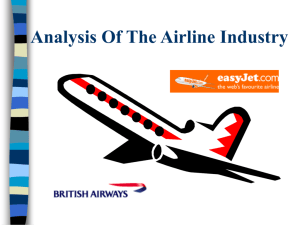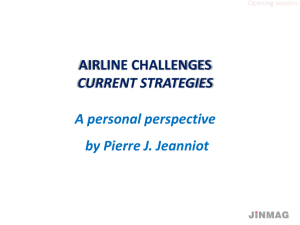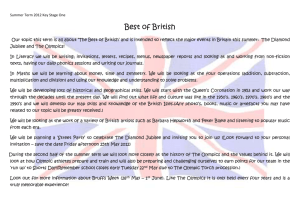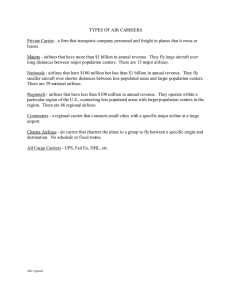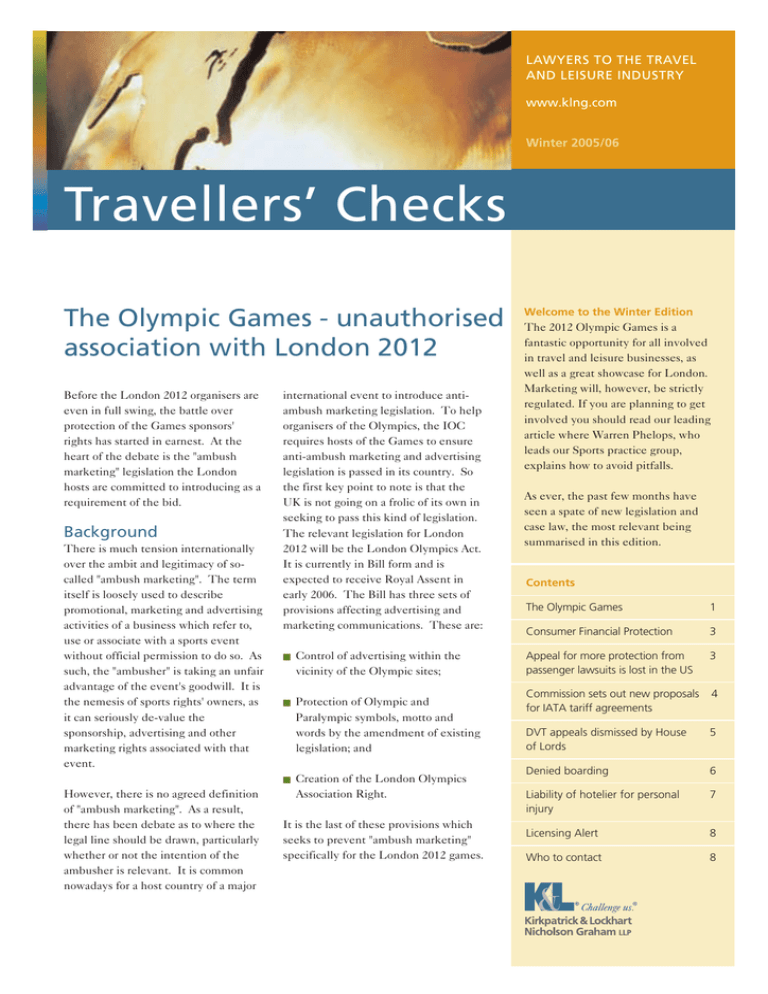
LAWYERS TO THE TRAVEL
AND LEISURE INDUSTRY
www.klng.com
Winter 2005/06
Travellers’ Checks
The Olympic Games - unauthorised
association with London 2012
Before the London 2012 organisers are
even in full swing, the battle over
protection of the Games sponsors'
rights has started in earnest. At the
heart of the debate is the "ambush
marketing" legislation the London
hosts are committed to introducing as a
requirement of the bid.
Background
There is much tension internationally
over the ambit and legitimacy of socalled "ambush marketing". The term
itself is loosely used to describe
promotional, marketing and advertising
activities of a business which refer to,
use or associate with a sports event
without official permission to do so. As
such, the "ambusher" is taking an unfair
advantage of the event's goodwill. It is
the nemesis of sports rights' owners, as
it can seriously de-value the
sponsorship, advertising and other
marketing rights associated with that
event.
international event to introduce antiambush marketing legislation. To help
organisers of the Olympics, the IOC
requires hosts of the Games to ensure
anti-ambush marketing and advertising
legislation is passed in its country. So
the first key point to note is that the
UK is not going on a frolic of its own in
seeking to pass this kind of legislation.
The relevant legislation for London
2012 will be the London Olympics Act.
It is currently in Bill form and is
expected to receive Royal Assent in
early 2006. The Bill has three sets of
provisions affecting advertising and
marketing communications. These are:
Control of advertising within the
vicinity of the Olympic sites;
Protection of Olympic and
Paralympic symbols, motto and
words by the amendment of existing
legislation; and
However, there is no agreed definition
of "ambush marketing". As a result,
there has been debate as to where the
legal line should be drawn, particularly
whether or not the intention of the
ambusher is relevant. It is common
nowadays for a host country of a major
Creation of the London Olympics
Association Right.
It is the last of these provisions which
seeks to prevent "ambush marketing"
specifically for the London 2012 games.
Welcome to the Winter Edition
The 2012 Olympic Games is a
fantastic opportunity for all involved
in travel and leisure businesses, as
well as a great showcase for London.
Marketing will, however, be strictly
regulated. If you are planning to get
involved you should read our leading
article where Warren Phelops, who
leads our Sports practice group,
explains how to avoid pitfalls.
As ever, the past few months have
seen a spate of new legislation and
case law, the most relevant being
summarised in this edition.
Contents
The Olympic Games
1
Consumer Financial Protection
3
Appeal for more protection from
passenger lawsuits is lost in the US
3
Commission sets out new proposals
for IATA tariff agreements
4
DVT appeals dismissed by House
of Lords
5
Denied boarding
6
Liability of hotelier for personal
injury
7
Licensing Alert
8
Who to contact
8
Travellers’ Checks
The London Olympics
Association Right ("LOAR")
The LOAR extends, and is in addition
to, the Olympic Association Right and
Paralympics Association Right which
will be found in the amended Olympic
Symbols etc (Protection) Act 1995 (the
"1995 Act"). It is aimed at those who
use creative ways of making an association with the London Olympics without
using the specific words or symbols protected under trade mark rights or under
the 1995 Act.
The LOAR confers exclusive rights on
the London Organising Committee
(LOCOG) to use any representation (of
any kind) in a manner likely to suggest
to the public that there is an association
between the London Olympics and
goods or services or a person who
provides goods or services. An
infringement will occur where an
unauthorised person exercises that right
in the course of trade in relation to
goods or services.
What is an 'association'?
An "association" includes any kind of
contractual or commercial relationship,
corporate or structural connection, or
the provision of financial or other
support in connection with the Games.
Gratuitous use of the restricted words in
a manner in which they would not
normally be used is also prohibited.
The aim is to prevent use of the
restricted words solely as a means of
commercially exploiting the Games and
not in the course of legitimate
advertising of a product or service. A
statement in accordance "with honest
practices in industrial or commercial
matters" will not be an infringing
"association". An example given by
Richard Caborn, the Minister for Sport
and Tourism, was of a coach company
running trips to an Olympic event. Mr
Caborn said that "That company must
2
WINTER 2005/06
be allowed to refer to the fact that it is
running services … to the Olympic
park."
What are the restricted
words?
In addition to the Olympic words and
symbols protected by the 1995 Act,
("Olympics", "Olympian", the Olympic
Rings and so on), specified
combinations of expressions which,
when used, create a presumption of
infringement. The words specified
include any combination of "games",
"Two Thousand and Twelve", "2012",
and "Twenty Twelve" or use of any of
those expressions with any of the words
"gold", "silver", "bronze", "London",
"Medals", "sponsor" and "summer".
The presumption of infringement
seems to have caused some concern. It
remains the subject of some debate
whether the concept of an association
goes far enough to minimise those
concerns. In this regard an interesting
insight into the thinking behind the
provisions can be gleaned from a recent
debate on the Bill. The Minister said
that "We are concerned with catching
people who want to make a fast buck
out of 2012, not those who advertise
legitimately, who exploit the games in
the right way, and from whom we
receive benefit. That is the situation
that we are seeking to protect; we are
not going after the little granny who
owns the sweet shop at the bottom of
the road, in order to haul her before the
courts. That would be crazy."
Exceptions to the LOAR
However, there are exceptions which
will operate to provide some comfort to
advertisers. LOCOG can grant
authorisations (most likely to be
sponsors of the Games and the Olympic
Programme) and will be obliged to
publish a register of those granted
authorisation. Exceptions include:
Publishing or broadcasting a report of
a sporting or other event forming part
of the London Olympics;
Marketing goods in the European
Economic Area with authority from
LOCOG;
Use of registered trade marks in
relation to goods or services for which
that trade mark is registered;
Use by a person of his own name or
address; and
Use of indications concerning the
characteristics of goods or services or
a representation necessary to indicate
the intended purpose of a product or
service.
In each of the last three cases above the
use must be "in accordance with honest
practices in industrial or commercial
matters". It will be interesting to see
how these defences will be interpreted.
Certain provisions of the 1995 Act will
apply to the LOAR, including
protection of existing rights such as use
of the name of the company being the
company's corporate name or a name
under which a business is carried on in
either case immediately prior to the
London Olympics Act coming into
force.
Will there be any changes
to the Bill?
It is likely that further amendments will
be made before the London Olympics
Act is passed in 2006. The Act also
gives the Government wide powers to
amend the scope of regulations and
restrictions passed under the Act, so the
picture may remain uncertain for the
foreseeable future.
www.klng.com
Consumer Financial Protection
Association of British Travel Agents Limited v Civil Aviation Authority
On 16 January 2006 Mr Justice
Goldring provided guidance on the
correct meaning of "package holiday"
for the purposes of the Civil Aviation
(Air Travel Organisers Licensing)
Regulations 1995. He said that:
component parts of the package and
that the consumer is buying and
paying for them as a whole - the
consumer cannot buy one element
without buying the other; and
A package holiday will only be
created where a combination of
transport, accommodation and/or
other tourist services is sold, or
offered for sale, at an "inclusive
price";
The sale or offer for sale at an
"inclusive price" means that there is
a relationship between the
The words "inclusive price" are key
to the definition of a package holiday
and should be given their ordinary
and natural meaning. This is not the
same as "total price".
Many arrangements which might be
classed as tailor made or dynamically
packaged will not be package holidays
for the purposes of the ATOL
Regulations.
It was confirmed that liability for the
performance of a contract for a package
holiday and the responsibility for the
provision of consumer protection will
be a matter of ordinary English law of
contract, and in particular, the law of
agency. If a travel agent acts properly as
the agent of a principal he will not be
liable under the contract for the
package holiday. Mr Justice Goldring
ordered that Guidance Note 26 issued
by the CAA in March 2005 be quashed.
Leave to appeal was refused but the
CAA is seeking permission from the
Court of Appeal to appeal the decision.
Appeal for more protection from passenger lawsuits is
lost in the US
In the US, cruise lines, railways and other
"common carriers" are in certain cases
subject to strict liability. Strict liability is
a legal doctrine which makes a person or
an organisation responsible for damage
caused by their actions regardless of
whether or not they are at fault. The
defendant need not have intended or
known about the circumstance or
consequence for liability to be imposed.
In the US this means that "common
carriers" are legally responsible for the
misconduct of their workers. In the UK
a similar result is achieved through the
use of the principle of vicarious liability
which results in an employer being held
liable for any wrongful acts of its
employees during the course of their
employment. However, in the UK, there
is no differentiation between different
types of employer, as there in the US,
whose law holds "common carriers" to a
higher standard than other employers.
On this basis in Jane Doe v Royal
Caribbean a US federal jury awarded a
passenger on a Royal Caribbean cruise
liner, (identified only as "Jane Doe") $1
million in compensation after she
claimed that she was sexually assaulted
by a ship waiter whilst ashore in
Bermuda.
The passenger allegedly met the waiter
at a nightclub in Bermuda where she is
said to have become intoxicated. The
waiter then walked the passenger to a
park and had what he later testified to
be consensual sexual intercourse.
The passenger sued Royal Caribbean,
as well as two companies responsible
for food and drink services on the ship.
Although her complaint originally
named the waiter, she pursued the
lawsuit only against the companies.
Royal Caribbean urged the Supreme
Court to agree to an appeal and were
joined by the International Council of
Cruise Lines in doing so.
They argued that the century-old strict
liability standard is out of date and that
there is "no compelling rationale for
holding common carriers to a higher
standard of care than other employers".
This standard is more stringent than
the rules that apply to hotels,
amusement parks and casinos.
The passenger urged the Supreme
Court not to get involved. She argued
that the strict liability standard is
appropriate because of the "element of
trust inherent in the common carrierpassenger relationship". The 11th US
Circuit Court of Appeals agreed and on
1 November 2005 Royal Caribbean lost
the right to appeal the case, the court
referring to two late-nineteenth century
Supreme Court cases imposing the
strict liability position on ships for
injuries suffered by passengers.
WINTER 2005/06
3
Travellers’ Checks
Commission sets out new proposals for IATA
tariff agreements
IATA passenger tariff conferences
currently benefit from a Block
Exemption Regulation which exempts
those conferences from the EU
competition laws prohibiting anticompetitive agreements (contained in
Article 81 of the EU Treaty). This
Block Exemption is now under review
with the Commission who are proposing
to remove the exemption for
conferences affecting routes within the
EU as from 1 January 2007 and for
routes between the EU and non-EU
countries, as from 30 June 2008.
IATA passenger conferences were one
of the first industry initiatives to enable
efficient interlining to take place. As
most readers will be aware, interlining
allows passengers to travel from A to C
via B using one ticket but two airlines
(A-B and B-C). In addition the
4
WINTER 2005/06
arrangement allows for passengers'
baggage to follow through from A-C
without having to be checked in again
at airport B. This obviously saves a
great deal of time. In recent years,
however, airlines have developed
alternatives to the IATA tariff
conferences such as global airline
alliances, code-sharing systems and
bilateral interlining agreements. These
newer arrangements sometimes offer
airlines greater flexibility and/or other
commercial advantages.
The Commission considers that the
removal of the exemption for the IATA
tariff conferences will not have a
significant impact on the airlines. The
significance of IATA interlining has
reduced as alternative arrangements
have grown in importance and
popularity, especially among EU-based
airlines. Accordingly, the Commission
believes the time has come to remove
the automatic exemption for IATA
interlining, certainly within the EU.
This will not mean that the IATA
arrangements will automatically become
unlawful, but it will remove the
assumption that that they are always
compliant with competition laws.
The Commission also proposes to
remove the exemption for IATA slots
and scheduling conferences which in
the Commission's view do not infringe
competition laws and therefore do not
need the protection of the current
Block Exemption.
The Commission will now consult with
Member States and third parties before
adopting a final revised Block
Exemption in 2006.
www.klng.com
DVT Appeals dismissed by House
of Lords
On 8 December 2005 the House of
Lords unanimously held that victims of
deep vein thrombosis (DVT) did not
have the right to claim compensation
from airlines. DVT can develop when
a blood clot forms when movement is
restricted and often starts in the leg but
can be fatal if it reaches the lungs or
brain.
jurisdictions.he most important points
to note from the judgment are as
follows:
The Law Lords felt that it was
significant that the Convention's
drafters selected the word "accident"
for use in Article 17 whereas they
chose "occurrence" in Article 18.
Although both terms indicate that
something has happened, the
meaning of "occurrence" is more
general than "accident". The Lords
felt that the word "accident" must
have been selected by the drafters to
mean an occurrence having particular
characteristics. They held that the
language of the Convention must
always be the starting point.
The Lords held that the
requirements of an Article 17
accident are that an event or
happening that occurs which is more
than the normal operation of the
aircraft and is external to the
passenger. In this case these two
requirements were not met.
An airline's failure to warn its
passengers of the dangers of DVT
and the precautions that they should
take to guard against it will not assist
the passengers' case where there is
no established practice to issue such
warnings. The Lords did not
consider the position if there had
been such a practice in place.
Members of the Victims of Air-Related
DVT Association (VARDA) sued
British Airways and other airlines for
death and injury allegedly caused by
conditions on flights such as cramped
seats. They also claimed that airlines
do not do enough to warn passengers
about the dangers of DVT while
travelling on aircraft.
The airlines in question were bound by
the Warsaw Convention, as amended at
the Hague, which sets out rules
governing an airline's liability. Article
17 states that carriers are only liable for
"death, wounding or bodily injury… if
the accident that caused the damage
took place on board the aircraft".
British Airways and the other airlines
involved in the litigation maintained
that they could only be liable for
"accidents" and argued that DVT did
not fall into this category.
The case focused on the meaning of
the word "accident". This has been
defined in previous cases as an unusual
event; something out of the ordinary.
The Law Lords held that since there
was nothing unusual occurring in the
course of the flights, "the situation does
not fall within any ordinary or extended
conception of "accident".
Similar views have been expressed by
courts in a number of other
This decision should come as a relief to
the airline industry and its insurers; had
the outcome been unfavourable,
airlines throughout the world may well
have faced huge damages claims.
WINTER 2005/06
5
Travellers’ Checks
Denied boarding - mixed decisions for the
airline industry
The EC Denied Boarding Regulations
261/2004 ("the Regulations") came into
force on 17 February 2005 and impose
a potentially significant liability on
airlines to customers in the event of
denied boarding, late departure or
flight cancellation. The Regulations
require airlines to provide
compensation and assistance to
passengers in certain situations. On 18
November 2005 judgment was handed
down in the first known case brought
under the Regulations. The case was
successfully defended by KLM in the
UK.
The Case against KLM
The case concerned a KLM flight that
was due to depart from Amsterdam for
Newcastle but was cancelled because
of a fuel leak which could not be
repaired in time to operate the flight.
As a result all 91 passengers were rerouted to their final destinations on
different flights.
A claim was brought against KLM
under Article 7 of the Regulations
which entitles passengers to fixed
amounts of compensation in the event
6
WINTER 2005/06
of denied boarding or cancellation of a
flight. Under the Article passengers are
entitled to EUR 250 compensation if
the flight is 1,500 kilometres or less and
they are denied boarding or the flight is
cancelled. However, under Article 5
passengers will not be entitled to
compensation where cancellation is
caused by "extraordinary circumstances
which could not have been avoided
even if all reasonable measures could
have been taken".
In the Newcastle County Court,
District Judge Powell held that the fuel
leak leading to the cancellation fell
within Article 5. He accepted KLM's
argument that they could not be
expected to keep spare aircraft
available for use in such circumstances.
This is a positive decision for the
airline industry. Airlines cannot be
expected to pay compensation where
situations are beyond their control.
Passenger safety must always be the
paramount concern. We await further
decisions that will assist in clarifying
the scope of the Regulations.
ECJ ruling just released
The European Court of Justice has just
issued its ruling on a case that was
brought by a number of European
airlines. The airlines argued that the
Regulations were contrary to the
provisions of the Montreal Convention
which sets out international rules on
the liability of airlines for any delays.
Some airlines say that the Regulations
have left them with an unsustainable
financial risk. Low cost carriers, in
particular, say that the Regulations may
force them to compensate the
passenger at a cost many times the
actual price of a ticket.
The ECJ has followed the Opinion of
the Advocate General given last year
and has concluded that the Regulations
and the Convention are
complementary. The Court noted that
the loss and inconvenience suffered by
passengers through cancellations and
delays was not affected by the choice of
airline and accordingly low cost airlines
had to be treated in the same way as all
other airlines under the Regulations
The airlines will be disappointed in
this ruling but may gain comfort from
the interpretation of Article 5 of the
Regulation referred to above, which
suggests that the national courts may
be willing to interpret "extraordinary
circumstances" in a manner which will
limit the volume of claims.
www.klng.com
Liability of hotelier for personal injury - Occupiers
Liability Act 1957
Christian Lewis v Six Continents Plc
(2005) is a recent Court of Appeal case
concerning the liability of an owner of a
hotel to a guest under the Occupiers
Liability Act 1957.
purposes for which they are invited or
permitted. Mr Lewis argued that the
hotelier had breached this duty in not
limiting the way in which the window
opened.
The Claimant, Mr Lewis, suffered
severe head injuries falling from a
second floor bedroom window. He had
no recollection of how he had fallen. He
brought a claim against the hotel under
the Occupiers Liability Act 1957.
Section 2 of this Act states that an
occupier of premises owes the "common
duty of care" to all visitors. This means
that the hotel must take reasonable care
to ensure that visitors will be reasonably
safe in using the premises for the
At first instance the trial judge had held
that the hotel owner had not breached
this duty. He said that it would not
have been reasonably practicable to
place a duty on all hotel owners to assess
dangers posed by all windows in all
buildings.
On appeal, Mr Lewis argued that the
judge had adopted the wrong approach
and that he should have asked the
question "What should this hotel have
done about this window bearing in mind
why this guest was using the premises?"
The Court of Appeal held that the
question to be asked was whether the
window was unsafe for anyone and not
this particular guest. The evidence was
that the window did not present any
obvious danger to an adult, no accident
had ever previously occurred and it was
not therefore reasonably foreseeable
that an adult would lean out of the
window in such a way as to say the
hotelier should have limited the way the
window opened.
Accordingly, the appeal was dismissed
and Mr Lewis' claim failed.
WINTER 2005/06
7
Travellers’
Checks
Travellers’ Checks
Licensing Alert
The Licensing Act 2003 came into force
on 24 November 2005 despite a last
ditch attempt on 15 November 2005 by
a number of Conservative MPs to annul
it. They, like many critics, claim the
changes in the licensing laws will
compound the UK's problem with
binge drinking and lead to more
alcohol-related violence and disorder. It
remains to be seen what the impact of
the many extended licences will be but
it is hoped that the increased police
powers will be able to deal more
effectively with any alcohol fuelled
disturbances.
Under the new Act all of the 190,000
licensed premises in England and
Wales had to reapply for a new licence
to sell alcohol. Of those 190,000
premises, around 70,000 pubs, clubs
and stores have been granted longer
opening hours and more than 1,000
have been granted around the clock
licences.
You may have read in the press about
the problems some pubs are
experiencing in obtaining new licenses
from their Local Authorities. Our
experience has been that their backlog
is huge and in some cases we have been
waiting for over three months for fresh
applications/conversions to be
processed.
The reasons given by the Local
Authorities are many. They say that
many application forms were completed
incorrectly and had to be returned,
adding to the administrative time spent
on processing other correctly completed
forms. In addition, applications for
licenses are only granted after
authorities consider the impact on the
community. This seems to have been a
lengthy exercise. The process of
granting new licences/conversions has
also taken longer as people have been
using the new powers granted to them
Who to Contact
in the Act to object to applications.
Figures from the Department for
Culture, Media and Sport show that one
in four establishments applying to
change their hours met objections from
residents and police.
Local Authorities have been forced to
threaten legal action against the
Government to recover the costs of
administering the licences. Most
councils say that fees for issuing new
licences have not matched the costs
incurred. An unpublished Local
Government Association survey found
that most council licensing departments
are in debt due to the new system.
Council Tax bills could rise as a result.
It will be interesting to see whether
problems with the new system resolve
themselves over the next few months.
Ministers will be monitoring the impact
of the new system closely by reference
to a number of pilot areas in the UK.
Kirkpatrick & Lockhart
For further information contact
Nicholson Graham LLP
Cynthia Barbor
cbarbor@klng.com
T: +44 (0)20 7360 8170
110 Cannon Street
Laura Harcombe
lharcombe@klng.com
T: +44 (0)20 7360 8186
London EC4N 6AR
Polly Woodfield
pwoodfield@klng.com
T: +44 (0)20 7360 8180
www.klng.com
T: +44 (0)20 7648 9000
F: +44 (0)20 7648 9001
Kirkpatrick & Lockhart Nicholson Graham (K&LNG) has approximately 1,000 lawyers and represents entrepreneurs, growth and middle
market companies, capital markets participants, and leading FORTUNE 100 and FTSE 100 global corporations nationally and
internationally.
K&LNG is a combination of two limited liability partnerships, each named Kirkpatrick & Lockhart Nicholson Graham LLP, one qualified
in Delaware, U.S.A. and practicing from offices in Boston, Dallas, Harrisburg, Los Angeles, Miami, Newark, New York, Palo Alto,
Pittsburgh, San Francisco and Washington and one incorporated in England practicing from the London office.
This publication/newsletter is for informational purposes and does not contain or convey legal advice. The information herein should
not be used or relied upon in regard to any particular facts or circumstances without first consulting a lawyer.
Data Protection Act 1998 - We may contact you from time to time with information on Kirkpatrick & Lockhart Nicholson Graham LLP
seminars and with our regular newsletters, which may be of interest to you. We will not provide your details to any third parties. Please
e-mail cgregory@klng.com if you would prefer not to receive this information.
8
WINTER 2005/06
© 2006 KIRKPATRICK & LOCKHART NICHOLSON GRAHAM LLP. ALL RIGHTS RESERVED.

